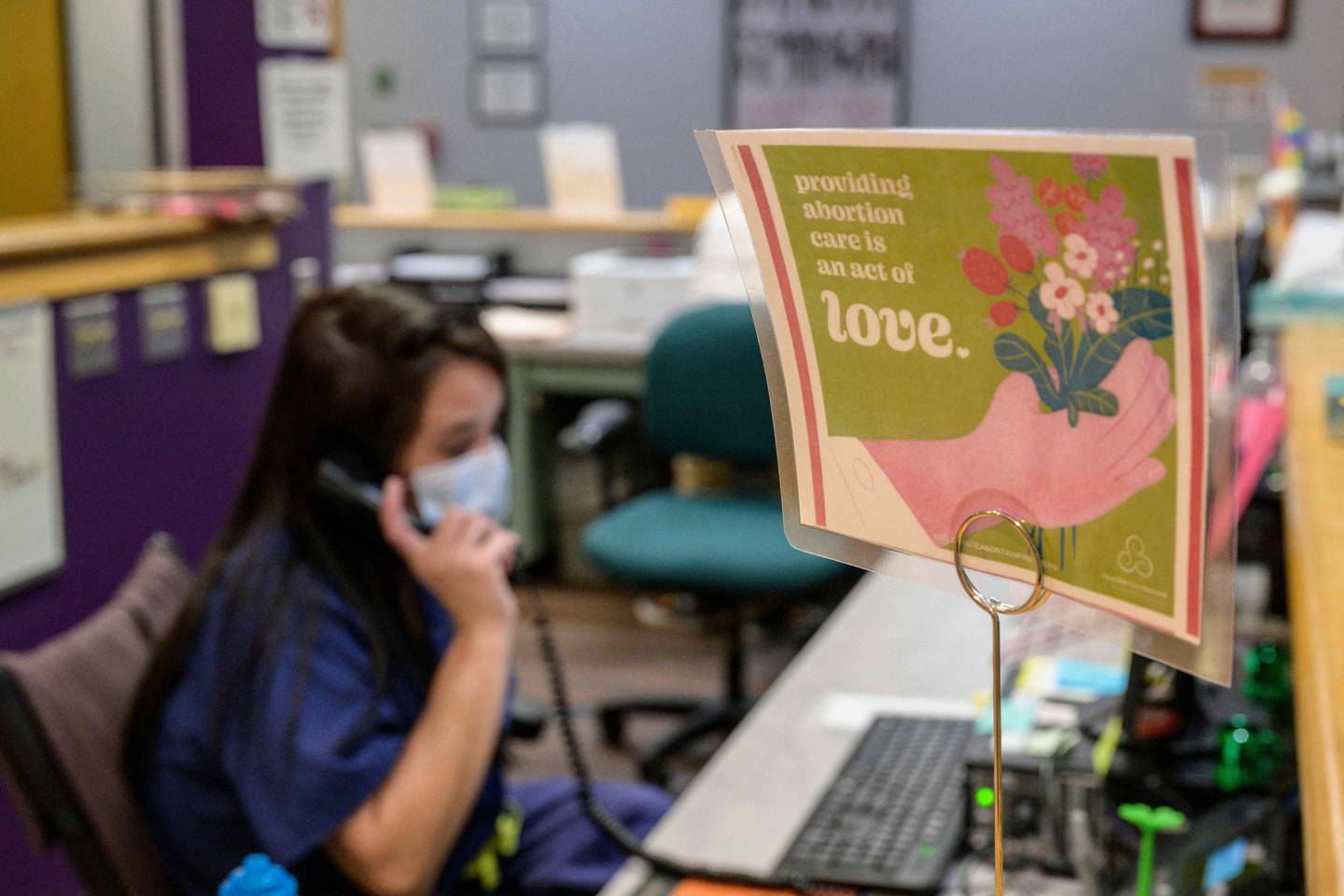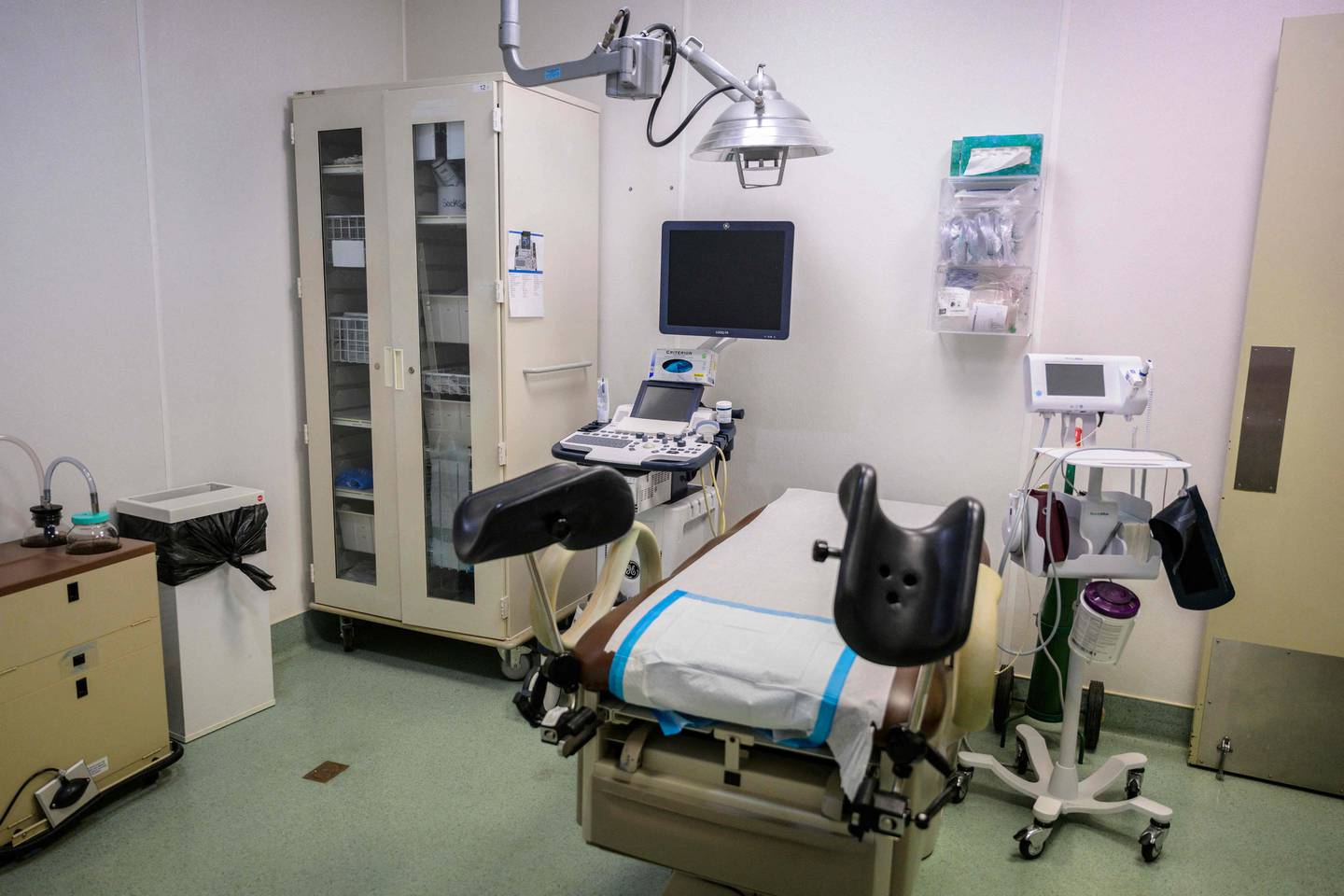Hundreds more out-of-state patients are having abortions at Planned Parenthood clinics in Illinois and wait times to schedule the procedure in the southern part of the state have spiked during the first month after the U.S. Supreme Court overturned Roe v. Wade.
Before the June 24 ruling, when abortion was still legal nationwide, a patient could schedule an appointment to terminate a pregnancy in three or four days in southern Illinois; now it’s taking on average three weeks or more because of a massive influx of out-of-state patients, according to Planned Parenthood of the St. Louis Region and Southwest Missouri, which also covers the southern region of Illinois.
Advertisement
“One month later, I would say that our biggest surprise was really around how quickly our capacity dwindled,” said Bonyen Lee-Gilmore, spokeswoman for the Planned Parenthood affiliate. “Our best guess, before Roe was overturned, was that this would happen over time. Especially because we knew that abortion wasn’t going to be banned in all the states all at once. It depends on if you have trigger laws, pre-Roe bans and some states have litigated their trigger bans. So we knew there was going to be a patchwork and access would fall. But we thought it would fall a little slower than what’s happened.”
The influx of out-of-state patients has also surged in other parts of the state, but so far wait times to have an abortion in the Chicago area haven’t increased significantly, according to Planned Parenthood of Illinois, which includes 17 health centers, most of which are located in Chicago and the suburbs.
Advertisement
Before Roe was overturned, Planned Parenthood of Illinois provided abortions to roughly 100 out-of-state patients each month. In July, the first full month after the ruling, the number of abortion patients coming from other states swelled to more than 800, according to the agency.
Those seeking an abortion in Illinois are also traveling from more states than before, at increasing distances.
Planned Parenthood of Illinois clinics would typically treat abortion patients from 12 to 15 states besides Illinois, before abortion rights were overturned. Since the fall of Roe, patients have been coming from 30 states, said Kristen Schultz, chief strategy and operations officer for Planned Parenthood of Illinois.
“The geography is also expanding,” she said. “We have now seen more patients than ever from Wisconsin, Ohio, Tennessee, Missouri, Kentucky, Texas. The travel time is increasing. The need is increasing. The stress is increasing.”
While Planned Parenthood of Illinois has been able to handle the influx with no major impact on wait times so far, there’s no guarantee that capacity will be able to keep up with demand as more states implement abortion bans or stringent restrictions, officials said.
“I think what every provider is doing — both us and the folks in the south — (is) preparing for as many patients as we can,” Schultz said. “Every day things are changing and there’s always certainly the potential wait times will increase. But again, we are employing strategies to increase capacity and meet that demand.”
Delaying the time-sensitive procedure can increase the gestational age of the pregnancy at the time of the abortion, potentially complicating the procedure and increasing the risk to the patient.
“Time, travel, money, risk, all of it,” Gilmore said. “It just makes the whole thing drag out longer and more complicated.”
Advertisement

She recounted one recent case where an out-of-state patient was anemic and required a blood transfusion prior to the abortion. The patient was sent to another state to have the transfusion but was turned away.
“A lot of hospitals from banned states are trying to get advice from their lawyers about whether they are going to be considered aiding and abetting an abortion and whether it qualifies under the medical emergency exception,” Gilmore said.
She said the patient ultimately went to a third state to have the blood transfusion and then came back to Illinois to terminate the pregnancy.
“It is getting vastly more complicated than it was pre-Roe, in that it isn’t just about the logistics of getting a patient in or on a certain time frame,” she said. “That patient may need extra support care. … And we’re now living in a landscape where medical providers in hospital systems and doctors’ offices are turning patients away for that care because they don’t want to be criminally liable or liable in any other sense in this new hostile landscape, where politicians are trying to criminalize providers.”
Reproductive rights advocates and abortion providers across the state have been planning for years for the end of Roe, the watershed 1973 Supreme Court ruling that established the right to an abortion nationwide.
After the demise of those federal protections, the matter of abortion rights fell to individual states, roughly half of which were expected to ban terminating a pregnancy or significantly curb access to the procedure.
Advertisement
In the first month or so following the fall of Roe, 43 clinics across 11 states have stopped providing abortions, according to the Guttmacher Institute, a research group that supports abortion rights.
Missouri, South Dakota, Arkansas, Mississippi, Oklahoma, Alabama and Texas have implemented abortion bans with limited or no exceptions, and now have no abortion clinics operating statewide, according to a Guttmacher report from July.
“In 2020, these seven states accounted for 80,500 abortions, or an average of about 6,700 abortions each month,” the report said. “Now, thousands of individuals who need an abortion in these states will be forced to travel to another state to reach a clinic, self-manage their abortion or carry the pregnancy to term.”
Providers in Wisconsin have also stopped offering abortions amid legal uncertainty over the state’s 1849 abortion ban, which includes exceptions for maternal life endangerment.
Numerous other states have implemented abortion bans early in pregnancy, significantly limiting the procedure. Across the country, court battles and heated legislative sessions are still defining the parameters and circumstances when a pregnancy can be legally terminated in various states.

Illinois, however, has some of the strongest reproductive rights protections in the nation, after the 2019 Reproductive Health Act established abortion as a “fundamental right.” It has long been considered an oasis for abortion care in the restrictive Midwest, and that role was augmented after Roe crumbled.
Advertisement
Planned Parenthood of Illinois has predicted that 20,000 to 30,000 more patients will be crossing state lines to have an abortion here each year. That’s on top of the rising number of out-of-state patients who were already traveling here to terminate a pregnancy while Roe was still the law of the land.
Nearly 10,000 patients came from other states to Illinois to have an abortion in 2020, according to the most recent data available from the Illinois Department of Public Health. The number of patients crossing state lines to terminate a pregnancy in Illinois has increased since 2014.
To increase capacity, Planned Parenthood of Illinois opened a clinic near the Wisconsin border in Waukegan in 2020 and a clinic near the Indiana border in Flossmoor in 2018. In mid-July, the organization announced that Planned Parenthood of Wisconsin doctors, clinicians and other staff members had begun traveling to the Waukegan clinic to provide abortion care amid the increase in demand.
A few months ago, Planned Parenthood of Illinois started offering abortion pills by mail to in-state residents who qualify for the service; out-of-state patients must travel to Illinois to have a telehealth or in-person visit with a provider and then pick up the medication at an in-state health center.
The massive influx of out-of-state patients has hit southern Illinois providers particularly hard, in part because this region only has two abortion clinics. For some patients in various Midwestern and Southern states, these are the closest abortion providers for hundreds of miles.
“Illinois is an island of reproductive health care in the region; southern Illinois is like a micro island in that region just because there are only two of us,” Gilmore said. “The concentration of patients vs. capacity is just way different. That is what we’re trying to help policymakers understand, in terms of the urgent need for capacity downstate. Because our reality is so different.”
Advertisement
There are about two dozen abortion clinics in Illinois, though the majority are in the Chicago area. Eleven of the 102 counties in Illinois have at least one abortion provider; in five of those counties, only medication abortions, which are restricted to early pregnancy, are available.
A new southern Illinois clinic is expected to open in Carbondale as soon as this month. Choices Memphis Center for Reproductive Health recently announced plans to open the clinic, in the wake of severe abortion restrictions in Tennessee. The new abortion provider will be about three hours from Memphis and Nashville.
In 2019, the Planned Parenthood affiliate in St. Louis opened a clinic in Fairview Heights, just over the border from Missouri. Hope Clinic in Granite City, just a few miles from St. Louis, also provides abortions in that area.
In January, the Regional Logistics Center opened inside the Fairview Heights clinic as a one-stop designated call center where traveling patients can get help booking lodging, coordinating transportation, finding child care and accessing funds to help pay for the procedure. The center is operated jointly by Hope Clinic and Planned Parenthood of the St. Louis Region.


Afternoon Briefing
Daily
Chicago Tribune editors’ top story picks, delivered to your inbox each afternoon.
Just as the number of out-of-state patients at Planned Parenthood of Illinois clinics have risen significantly, calls to the Regional Logistics Center have also increased following the Supreme Court ruling.
In May, the center received 648 patient calls; in June, calls increased to more than 1,100. As of mid-July, the number of calls were at 886, and were projected to rise to 1,600 by the end of the month, Gilmore said.
Advertisement
She added that since the end of Roe, the Fairview Heights clinic has seen a roughly 52% increase in the number of abortions that are past 15 weeks gestation.
“At our health center at least, we are seeing the consequences of abortion bans, (which are) pushing people later into pregnancy,” she said.
Gilmore added that delaying care — and the sense of uncertainty post-Roe — adds to patient stress.
“Once they figure out that yes, you can get an abortion here, we’re here to help, they’re relieved,” she said. “Because they’ve been navigating a system in a post-Roe reality and that can be very scary. A lot of them have been turned away by providers and they’ve really had to go searching for a place to land.”







